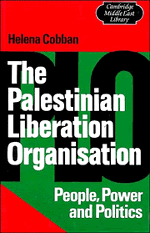Book contents
- Frontmatter
- Contents
- List of illustrations
- Preface
- Abbreviations
- Map 1 Palestine and the surrounding areas
- Introduction
- Part I History of the PLO mainstream
- Part II Internal relations
- PART III External relations
- 9 Arab relations
- 10 International relations
- Conclusions
- Appendixes
- Notes
- References and select bibliography
10 - International relations
Published online by Cambridge University Press: 26 January 2010
- Frontmatter
- Contents
- List of illustrations
- Preface
- Abbreviations
- Map 1 Palestine and the surrounding areas
- Introduction
- Part I History of the PLO mainstream
- Part II Internal relations
- PART III External relations
- 9 Arab relations
- 10 International relations
- Conclusions
- Appendixes
- Notes
- References and select bibliography
Summary
Ever since the issuing of the Balfour Declaration in 1917 and its subsequent endorsement by the League of Nations, Palestinian Arab community leaders have understood that, in common with other victims of colonial systems, their chances for political development would be subject to a vast input from external forces. Vital decisions affecting the political balance in Jaffa, Lydda or Jerusalem would henceforth be made in London, in Geneva or (later) Washington. The Zionist colonisers of Palestine understood this fact as well. Since the very birth of modern political Zionism, the Zionists' efforts to build up the Jewish community in Palestine had proceeded hand in hand with attempts to influence the decision-making process in the Western centres of power. Themselves generally of European origin, the pioneers of pre-1948 Zionism could move easily in British or other imperial circles, relying on a wide range of local Jewish and non-Jewish contacts to back up their efforts.
The Palestinian Arabs' diplomatic efforts in those years, by contrast, were feeble, timid, supplicatory and hampered by the bare fact that the Palestinian Arab supplications to the imperial power were always coming from outsiders. Unable to beat back the Zionist-imperialist challenge either on the ground in Palestine (though they made a staunch try in 1936–39) or in the chanceries of world power, the Palestinians lost their land in 1948. Though several of their previous diplomatic supplicants continued to make almost routine appeals to the United Nations or other bodies in succeeding years, their voices were lost because their hearers knew they represented nothing: Palestinian political society had been broken by the 1948 disaster.
- Type
- Chapter
- Information
- The Palestinian Liberation OrganisationPeople, Power and Politics, pp. 215 - 242Publisher: Cambridge University PressPrint publication year: 1984

